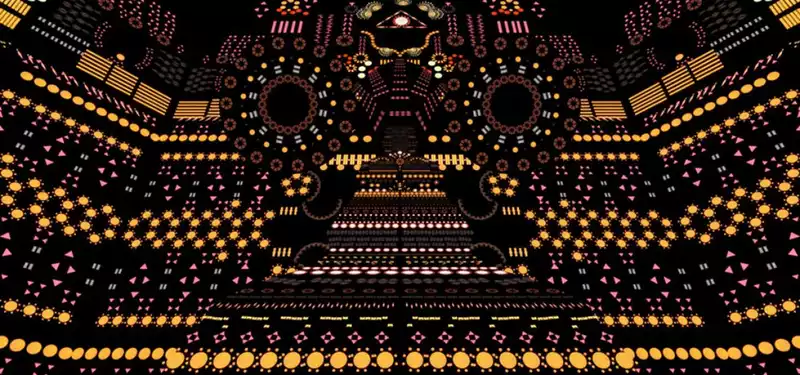Apr 8, 2016
Animator Max Hatler Accuses Bassnectar of Profiting from His Films
When does "VJ sampling" become copyright infringement-
Just as DJs, rappers, and other music artists sample the work of other music artists to create something new, VJs (video jockeys) use live concerts, clubs, museums, and other places to use the work of other artists to create a kind of visual collage for use. Rick James famously sued MC Hammer for the song "U Can't Touch This" (the case was settled out of court), and similar problems have arisen as sampling by VJs has become more prevalent.
Just ask media artist, animator, and filmmaker Max Hatler, who in 2011 won the award for best video installation at Multivision in St. Petersburg, Russia, a special award at the Visual Music Award in Germany In 2012, he won the Best Experimental Film Award at the TOFUZI International Animation Film Festival in Batumi, Georgia.
It was this style that caught the attention of electronic music artist and DJ Lorin Ashton, the creative force behind the renowned music and visual performance group Bassnectar. by 2011, Bassnectar was a member of Hatler's 2010 film "1923 aka Heaven" as a visual backdrop for his song "Rollz - Plugged In":
In 2013, Ashton's production team contacted Hatler himself and asked Bassnectar to create a VJ loop to be used on tour. They requested that Hatler be asked to work with them. Although the conversation between the two parties did not lead to any work, Bassnectar continued to use Hattler's work without permission and without paying Hattler, from 2013 to 2015, in live performances of Bassnectar's track "Frog Song." Bassnectar used Hattler's Sync as a visual accompaniment:
In addition, RadioEditAV, "a dedicated collective of directors, cinematographers, live visual artists, designers, animators, VJs, DJs and producers, provided Bassnectar with a visual package in 2013 that included a piece heavily inspired by Hutler's 1923 alias "Heaven":
Hutler, now a professor at City University of Hong Kong's School of Creative Media, just recently discovered that his work had been used without permission He took to Facebook to express his displeasure at the use of his work without his knowledge, permission, or compensation.
Bassnectar replied to Hattler on his Facebook page, offering to remove Hattler's work from his show, but did not offer compensation to Hattler, who had been using his work for the past six years. He also wrote that Hattler might benefit from the exposure that Base Nectar is giving him: "We give video artists a lot of good exposure, which leads to more work from them and often from us."
To some extent, Bassnectar is correct. U.S. copyright law protects what is known as "transformative use" or "productive use." However, if the use of the original work is merely a reproduction of the original work, copyright infringement may be established.
Further complicating matters, because VJ sampling is a relatively new form of creative activity, the law is uncertain and it is difficult to determine whether Bassnectar is liable for infringement. as with DJ sampling, much depends on the scope of the copyright holder's use of the work. In the notable case of Newton v. Bassnectar, the extent to which Bassnectar used the copyright holder's work determines whether it is liable. Diamond, the federal court ruled that the Beastie Boys' use of three notes from jazz artist James Newton's work "Choir" in their song "Pass the Mic" was too minimal to authorize infringement, as the three notes and six seconds of music were too minimal to authorize infringement. The court ruled that the use was permissible. (And the Beastie Boys had already obtained permission to use the soundtrack, and Newton sued for using the music without permission.) In music, copyright is recognized for both the sound recording and the actual composition.) As the above video attests, Bassnectar uses much more than 6 seconds of Hattler's work.
It is unconscionable that a highly successful artist such as Bassnectar, who charges six-figure booking fees per show, would use an independent artist's work without permission and without compensation Bassnectar's position is particularly problematic, and the company's use of Bassnectar's logo is a violation of the copyright law. Bassnectar claims that all Bassnectar fan art, including the Bassnectar logo, is sold through the Bassnectar Art Exchange and that Bassnectar gets its share.
"It is not OK to make art, use the Bassnectar logo, and sell art using the Bassnectar logo." That is not what true fans do, that is not what bassheads do, and that is not what I do." Apparently, using Bassnectar's intellectual property is not OK for Bassnectar, but using other artists' property is part of the DJ and VJ culture.
Cartoon Brew has reached out to Bassnectar for comment. No response was received at the time of publication of this article, but we will update this page if a response is received.
.



Post your comment